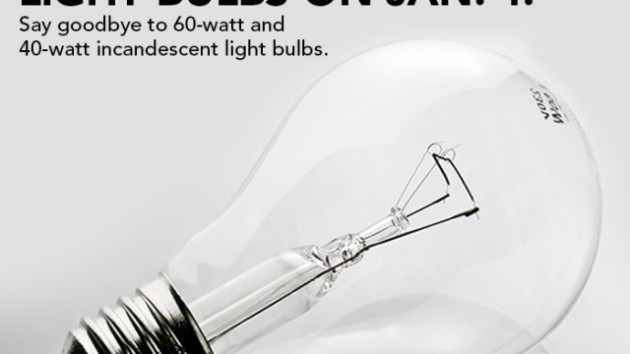Congress: No more Incandescent light bulbs for you!
In “Time to Stock Up on Incandescent Bulbs Before They Go Out Permanently“, Nicolas Loris reports, “If your New Year’s resolution is to change your light bulbs, don’t worry—the federal government’s here to help. Beginning January 1, 2014, the federal government will ban the use of 60-watt and 40-watt incandescent light bulbs. The light bulb has become a symbol in the fight for consumer freedom and against unnecessary governmental interference into the lives of the American people.”
In 2007, Congress passed and President George W. Bush signed into law an energy bill that placed stringent efficiency requirements on ordinary incandescent bulbs in an attempt to have them completely eliminated by 2014. The law phased out 100-watt and 75-watt incandescent bulbs last year.
Proponents of government-imposed efficiency standards and regulations will say, “So what? There are still plenty of lighting options on the shelves at Home Depot; we’re saving families money; and we’re reducing harmful climate change emissions.”
“The “so what” is that the federal government is taking decisions out of the hands of families and businesses, destroying jobs, and restricting consumer choice in the market. We all have a wide variety of preferences regarding light bulbs. It is not the role of the federal government to override those preferences with what it believes is in our best interest,” notes Loris.
Families understand how energy costs impact their lives and make decisions accordingly. Energy efficiency has improved dramatically over the past six decades—long before any national energy efficiency mandates.
Loris states, “If families and firms are not buying the most energy-efficient appliance or technology, it is not that they are acting irrationally; they simply have budget constraints or other preferences such as comfort, convenience, and product quality. A family may know that buying an energy-efficient product will save them money in the long term, but they have to prioritize their short-term expenses. Those families operating from paycheck to paycheck may want to opt for a cheaper light bulb and more food instead of a more expensive light bulb and less food.”
Some may read this and think: Chill out—it’s just a light bulb. But it’s not just a light bulb. Take a look at the Department of Energy’s Federal Energy Management Program. Basically anything that uses electricity or water in your home or business is subject to an efficiency regulation.
When the market drives energy efficiency, it saves consumers money. The more the federal government takes away decisions that are better left to businesses and families, the worse off we’re going to be.
Learns more about energy issues by going here.


